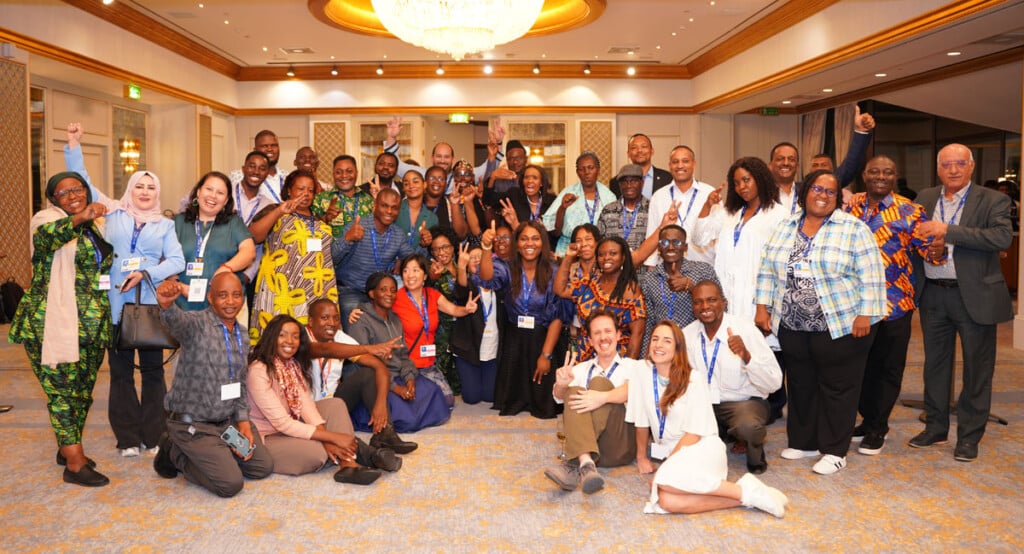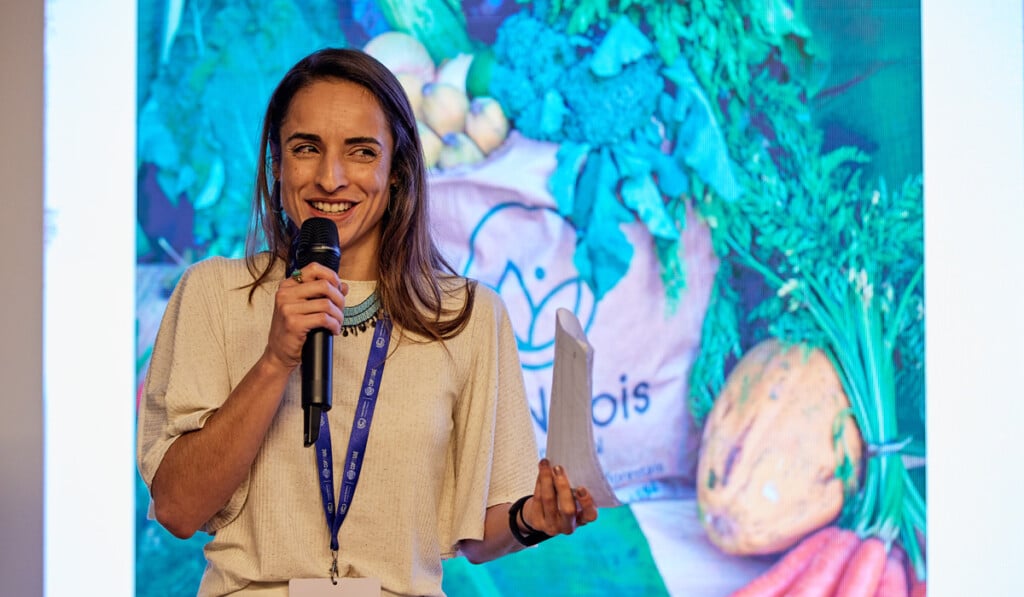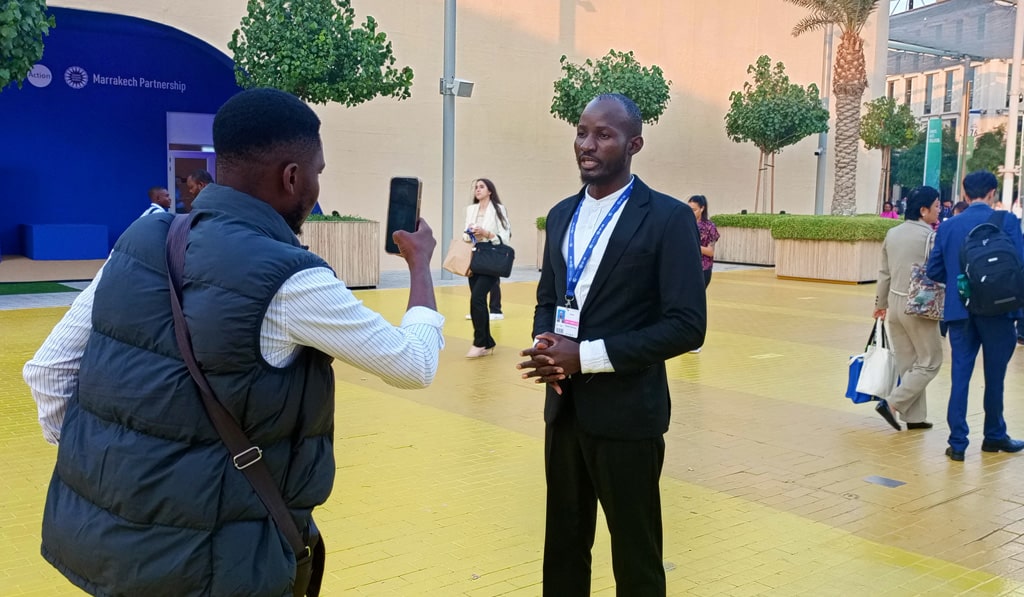How to ensure meaningful representation from frontline food and farming experts in global gatherings like COP
While the climate crisis is planetary in scale, there is tremendous value in bridging the gap between global and local to hear the stories and solutions of the people most affected by climate change.
We witnessed the power and influence of grassroots actors sharing their solutions at COP28 in Dubai. For the second consecutive year, the Global Alliance and its philanthropic network sponsored and coordinated a delegation of frontline food and farming experts. This cohort of 42 individuals represented farmers, fishers, grassroots activists, and NGO leaders from around the world—people rarely showcased on the international stage.
The philanthropic community must ensure these voices continue to be heard. The Global Alliance has seen time and time again the necessity of distributed leadership, especially in tackling climate change and transforming our food systems to be more resilient, healthy, diverse, and equitable.
Bringing together frontline experts across sectors and issues gives us a more accurate sense of what’s at stake and the solutions that will actually work on the ground. These individuals must have a seat at the table to determine what issues are discussed, what solutions are prioritized, and how financing should flow to support climate change mitigation and adaptation.

Our experience with this cohort revealed how supporting grassroot engagement at COP should go beyond paying for flights, hotels, and daily allowances, to helping individuals to meaningfully engage and make the most out of these global spaces. To that end, the Global Alliance carefully curated the delegate selection process, pre-COP preparation, and on-the-ground engagement.
Building on the lessons from our first COP delegation in 2022, here are three additional insights to advance the groundswell of interest from the philanthropic community in expanding or adopting similar initiatives in the future.
1. Make the messaging connect
Strategic communications is important to advance narratives in a crowded space like COP. Your message must be clear to be heard. A priority of the Global Alliance in Dubai was to ensure cohort members felt well equipped to share their key messages and stories on panel discussions and media interviews. We learned from year one that the absence of communications support can impede a delegate’s ability to meaningfully share their experiences and ideas.
To address this ahead of COP, cohort representatives attended media training sessions where they refined their key messages, learned what would resonate with journalists, and developed their understanding of how their experience fit in with broader negotiation themes.
“Feeling like I was able to represent my agenda and the work of the organizations I belong to was incredible and only possible due to the pre-COP preparation offered by the Global Alliance,” shared Karina Gonçalves David, a young agroforestry farmer from Brazil who spoke on six panels and was interviewed by a trio of media outlets “Often we as farmers feel like we are less, but at this COP and with the Global Alliance delegation, I was able to feel important.”

To facilitate media engagement, the Global Alliance created a Guide to Frontline Food and Farming Experts with brief bios of cohort members and information about their area of expertise. This compendium actively diversified discussions and promoted new spokespeople with compelling stories and calls to action. Many allies found this list useful and reached out to us for speaker recommendations.
Using this guide for proactive media outreach, cohort members were featured in 27 pieces of coverage, including platforms such as the BBC, The Guardian, Radio France Internationale, and Sky News Arabia.
2. Draw local connections at global gatherings
COP is a vital forum for civil society organizations to connect with government officials and other stakeholders. While often unable to participate in country-level diplomatic negotiations, COP offers the opportunity to influence the influencers and deepen relationships with allies that can be followed up at home.
Richard Kachungu from the Young Emerging Farmers Initiative in Zambia told us how his participation in COP28 meant country negotiators took him more seriously than they would have at national meetings. “The privilege of being heard by global leaders who are often challenging to engage with had a significant impact. It amplified the reach and influence of the initiatives advocated for and fostered a sense of collective responsibility among decision-makers,” shared Richard.
In addition to securing an audience with Zambian policymakers, Richard attended bilateral meetings with the Kenyan and German governments.

3. Focus on strengthening relationships
Finally, relationship building was essential to the successful outing of the Global Alliance’s cohort of food and farming leaders. As our COP initiative evolves in the coming years, it’s inevitable that we will need to lean on others with greater capacity and specialized expertise.
Irrespective of cohort size, this year we learned the importance of overseeing relationships with delegates in-house. Months before Dubai, we individually screened more than 2,600 cohort applicants from around the world, interviewed a shortlist of 100+ candidates, and selected 42 exceptional leaders who had strong key messages and greater clarity about the impact they wanted to have at COP.
Although this selection process was time consuming, it allowed relationship and trust building, and a greater familiarity with the work of the delegates. This allowed us to intentionally match applicants with the thematic topics that we knew would be a priority of the UAE COP Presidency. The deeper familiarity with cohort members also made it easier to select representatives for speaking opportunities and suggest possible collaborations.
We also made the decision to bring back one-third of our 2022 COP cohort. Doing so created mentorship opportunities wherein delegates who had a greater understanding of the event were able to support those who were attending for the first time. Tapping into this additional “alumni” capacity will continue to be an opportunity as the cohort grows.
A call to action for the philanthropic community
Ensuring a greater diversity of frontline food leaders have a say in the climate agenda is an ongoing process. Looking forward, the Global Alliance believes it is the responsibility of the philanthropic sector to support the amplification of underrepresented voices with a multi-year strategy and funds.
Global convenings like COP are the tip of the iceberg when it comes to the possible involvement of food and farming leaders. The most influential opportunities for grassroots groups to engage are in the granular, year-round negotiations that take place at local and national levels. This includes in the next 18 months as countries submit their revised national climate plans (NDCs) by 2025.
Each year we see food and agriculture take a more prominent role in climate convenings. With food systems responsible for one-third of greenhouse gas emissions and 15% of global fossil fuel consumption, it is imperative that climate action is centered on the sustainability, security, and equity of food and agricultural systems.
Bringing to the table grassroots food systems actors to share their stories and solutions is one way to ensure that happens. We celebrate the accomplishments of this year’s Global Alliance COP cohort, with an eye to the future for what this movement can achieve with continued support.
Vivian Maduekeh,
Program Lead: Climate and Health & Well-being
Header photo: Fotografía oficial de la Presidencia de Colombia, CC BY-SA 4.0, via Wikimedia Commons

